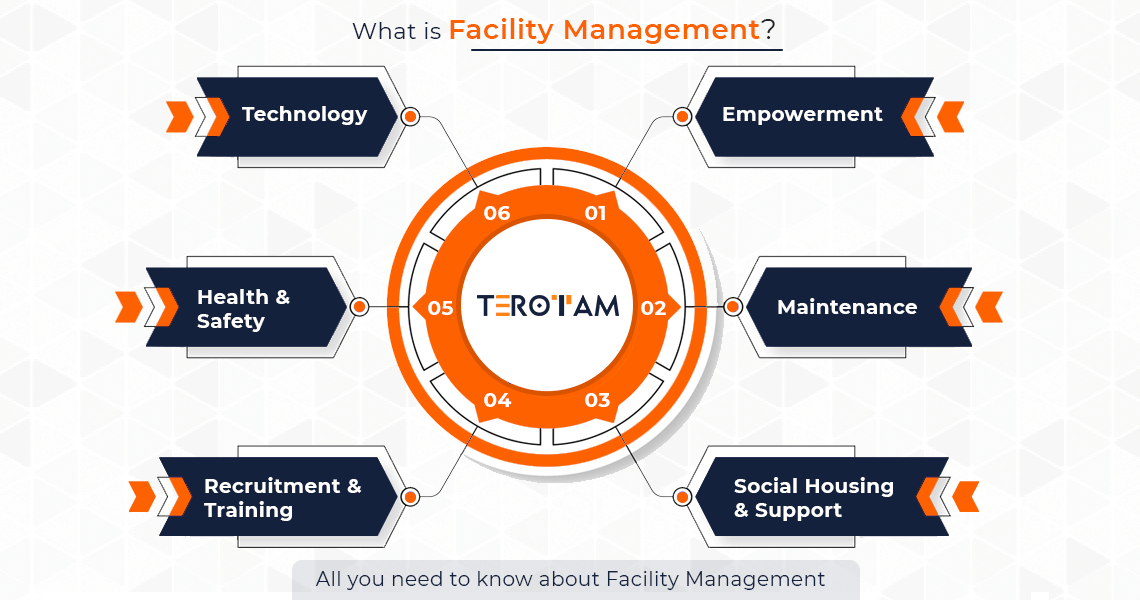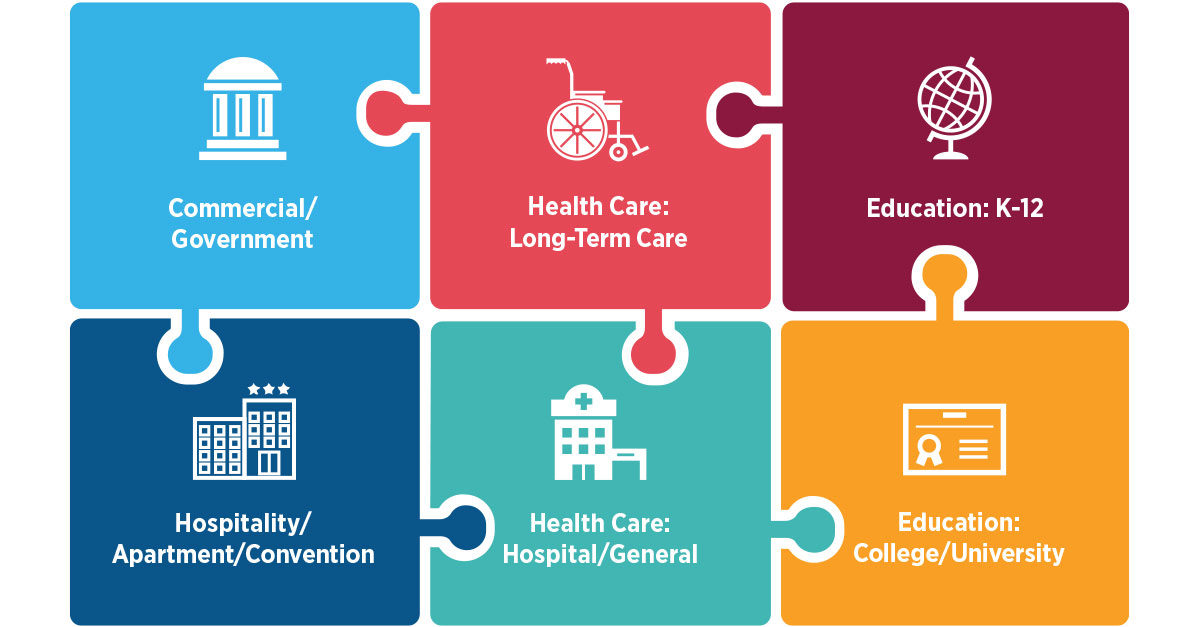Facility Management Services-- Ensuring Safety And Security and Maintenance
Facility Management Services-- Ensuring Safety And Security and Maintenance
Blog Article
Key Trends Shaping the Future of Facility Administration in 2024
As we look in advance to 2024, the landscape of facility monitoring is positioned for considerable improvement, driven by several crucial fads. The assimilation of clever building technologies and a shift towards data-driven decision-making pledge to boost functional performance while focusing on sustainability in technique.
Smart Structure Technologies
Smart building innovations incorporate a vast selection of systems, including intelligent lighting, HVAC controls, and security systems. By integrating these systems, facility managers can keep track of and change criteria in real-time, bring about significant decreases in power waste and operational prices. As an example, clever sensing units can identify tenancy degrees and readjust lighting and temperature accordingly, ensuring that power is just used when required.
In addition, these modern technologies assist in improved data collection, allowing companies to track use patterns and determine chances for additional enhancements. The execution of wise structure innovations not only adds to sustainability goals yet likewise creates much healthier workplace that can increase worker productivity and contentment.
As we relocate into 2024, the fostering of smart building modern technologies will likely increase, reflecting a more comprehensive change towards even more intelligent, receptive, and sustainable center management methods.
Data-Driven Decision Making
Significantly, organizations are leveraging data-driven decision making to boost center monitoring techniques. By taking advantage of data analytics, center supervisors can acquire actionable understandings that substantially boost operational effectiveness and resource allowance. The assimilation of innovative technologies, such as IoT sensing units and real-time surveillance systems, enables the collection of huge amounts of information on building efficiency, tenancy rates, and power consumption.
This wealth of information allows facility managers to recognize trends, predict maintenance needs, and proactively address problems prior to they rise. Predictive analytics can anticipate devices failings, lowering downtime and fixing costs. Furthermore, data visualization tools facilitate much better communication among stakeholders, guaranteeing that informed choices are made collaboratively.
Moreover, data-driven techniques enhance critical planning by making it possible for center managers to assess the efficiency of present techniques and make informed selections regarding financial investments in modern technology or infrastructure. As organizations significantly focus on functional excellence, data-driven decision making is positioned to come to be a keystone of effective center administration strategies in 2024 and beyond. Ultimately, the capability to leverage information efficiently will encourage organizations to develop more reliable, productive, and resistant facilities.
Sustainability and Eco-friendly Practices
The focus on data-driven decision making naturally lines up with the expanding concentrate on sustainability and environment-friendly techniques within center management. As companies increasingly prioritize ecological duty, center managers are leveraging analytics to maximize resource usage, decrease waste, and reduce carbon footprints. This tactical approach enables the integration of energy-efficient systems, such as LED lights, smart heating and cooling controls, and renewable resource resources right into center procedures.
Furthermore, the implementation Continue of lasting techniques prolongs beyond energy usage. Facility supervisors are adopting environmentally friendly products and promoting recycling initiatives to create a circular economic climate within their centers. This not only improves the environmental profile of the company yet additionally fosters a society of sustainability amongst workers.
Compliance with environmental laws is one more essential facet driving the fostering of eco-friendly methods. By making use of information analytics, center supervisors can keep an eye on compliance metrics and recognize locations for renovation, making sure adherence to international and neighborhood sustainability requirements.
Hybrid Job Models
A considerable change in the direction of hybrid job models is improving the landscape of center management in 2024. This standard incorporates in-office and remote job, requiring a reevaluation of area application, resource allotment, and employee involvement methods. Organizations are increasingly recognizing the importance of adaptable offices that accommodate diverse requirements and preferences.
Facility supervisors need to adapt by carrying out functional office designs that sustain collective initiatives while providing areas for concentrated work. This consists of the combination of innovation to help with smooth interaction and partnership amongst remote and in-office workers. Smart structure options, outfitted with sensors go and analytics, enable real-time surveillance of area usage, making it possible for organizations to optimize their atmospheres successfully.
Furthermore, hybrid work versions emphasize the need for effective center administration that focuses on staff member experience. This includes not only modern technology and space layout however also the advancement of plans that promote a well balanced work-life dynamic. As firms navigate this change, the function of center management becomes critical in creating an agile workplace that promotes productivity and drives organizational success. Essentially, the hybrid work model is transforming center administration, encouraging a proactive method to meet the advancing needs of the labor force.
Boosted Resident Wellness
As companies embrace hybrid work versions, a heightened concentrate on passenger health is coming to be indispensable to center management strategies. Facility Management. This change identifies that a completely satisfied and healthy labor force straight impacts efficiency and retention rates. Center supervisors are now prioritizing environments that advertise physical and mental health, integrating components such as natural illumination, biophilic layout, and obtainable wellness sources

Technology plays an important duty in this development. Smart structure systems can check environmental variables and change settings in real-time, ensuring optimal convenience degrees - Facility Management. Feedback systems, such as tenancy sensors and staff member studies, enable facility managers to continuously improve wellness efforts based on resident needs.

Verdict
In 2024, the future of center management will certainly be considerably influenced by the assimilation of smart building modern technologies and data-driven decision-making, cultivating improved functional efficiency. Sustainability initiatives will prioritize green techniques, while the emergence of crossbreed job versions will require versatile workplace designs. A heightened focus on passenger wellness with sophisticated Cooling and heating systems and biophilic design will certainly add to much healthier job atmospheres. These trends jointly underscore the progressing landscape of center management in action to contemporary obstacles and possibilities.
Facility managers are embracing environmentally friendly products and promoting recycling efforts to produce a round economic climate within their centers.A considerable change towards crossbreed work versions is reshaping the landscape of facility management in 2024.Additionally, hybrid work versions stress the requirement for reliable facility monitoring that focuses on worker experience.As companies embrace hybrid job models, an increased emphasis on occupant health is becoming important to center administration approaches.In 2024, the future of facility administration will certainly be considerably influenced by the combination of wise building modern technologies and data-driven decision-making, promoting enhanced operational effectiveness.
Report this page